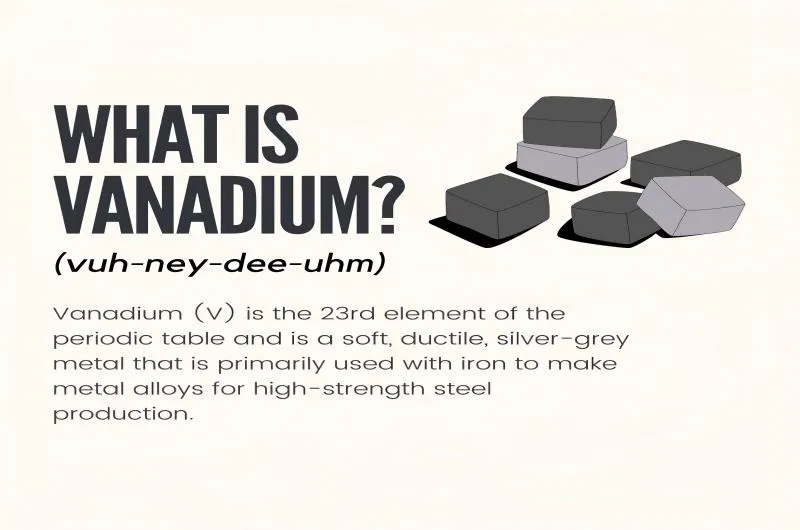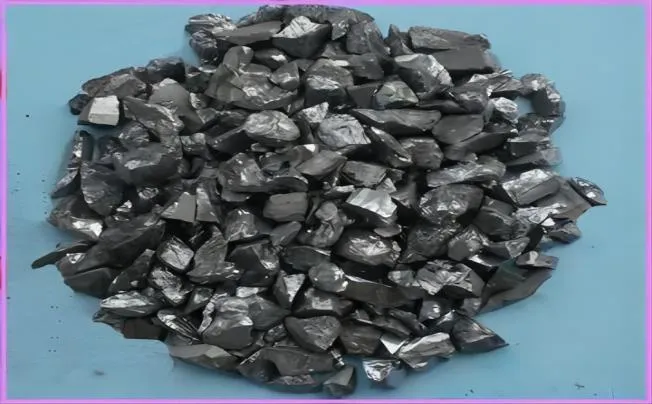BY  GENN
GENN
2024/12
Blog
Is Vanadium Steel Safe?
Utilizing materials like vanadium steel that meet stringent safety standards is essential to safeguarding human lives and preserving environmental sustainability.
The Mighty Strength and Resilient Toughness of Vanadium Steel
Vanadium steel is revered for its exceptional strength and toughness, making it a top choice for applications where durability is paramount. The addition of vanadium to steel enhances its overall tensile strength, allowing it to withstand heavy loads and high-impact forces without succumbing to deformation or failure.
This property is particularly crucial in industries such as automotive and construction, where structures and components are subjected to intense mechanical stress. Moreover, the toughness of vanadium steel is unmatched, providing a formidable defence against fractures and cracks even under extreme conditions.
This resilience ensures that products made from vanadium steel can endure harsh environments and demanding usage without compromising their structural integrity. Whether it’s in the form of tools, machinery parts, or infrastructure components, the ability of vanadium steel to resist fractures makes it a reliable choice for safety-critical applications.
The Impact of Vanadium Steel on Product Safety
The properties of high strength, toughness, wear resistance, and corrosion resistance exhibited by vanadium steel collectively contribute to elevating the overall safety standards of products manufactured from this advanced material. Whether it’s safeguarding structural integrity in critical infrastructure projects or enhancing reliability in precision machinery components, vanadium steel plays a vital role in mitigating risks associated with mechanical failures or environmental degradation. By incorporating vanadium steel into various industrial applications ranging from automotive engineering to aerospace technology, manufacturers can ensure that their products meet stringent safety requirements while delivering optimal performance levels.
The inherent ability of vanadium-enhanced materials to withstand extreme conditions with resilience and durability reinforces consumer confidence in the quality and safety aspects of end products. In essence, vanadium steel emerges as not just a material choice but a guardian angel ensuring product safety across diverse sectors.
Health Hazards Associated with Vanadium Exposure During Production
When it comes to the production of vanadium steel, one cannot overlook the potential health hazards associated with vanadium exposure. Workers involved in the manufacturing process are at risk of inhaling vanadium particles, which can lead to respiratory issues such as lung irritation and even more severe conditions like bronchitis or asthma.
Prolonged exposure to high levels of vanadium can also result in a condition known as vanadium poisoning, characterized by symptoms such as nausea, abdominal pain, and neurological disturbances. Therefore, stringent safety measures must be implemented in factories where vanadium steel is produced to protect the health and well-being of workers.
Applications of Vanadium Steel in Various Industries
A Driving Force in the Automotive Industry
Vanadium steel has established itself as a crucial material in the automotive sector, thanks to its exceptional properties that enhance performance and safety. Within engine components, vanadium steel is utilized for its high strength and heat resistance, ensuring durability under extreme conditions.
Furthermore, vanadium steel is instrumental in reinforcing the chassis of vehicles, providing rigidity and structural integrity to enhance overall safety standards. In suspension systems, the use of vanadium steel components contributes to improved handling and stability on varying terrains.
Reaching New Heights in the Aerospace Industry
The aerospace industry heavily relies on vanadium steel due to its unmatched strength-to-weight ratio, making it an ideal choice for aircraft structures and landing gear. The demanding conditions of flight require materials that can withstand tremendous stress and fatigue, qualities inherent to vanadium steel.
By incorporating this advanced material into aircraft construction, manufacturers ensure enhanced safety during flight operations. Vanadium steel’s resistance to corrosion also plays a key role in prolonging the lifespan of critical aerospace components.
Building Strong Foundations in the Construction Sector
In the construction industry, vanadium steel finds extensive applications in high-rise buildings, bridges, and various infrastructure projects that demand robust materials for long-term reliability. Its superior strength characteristics make it a preferred choice for structural elements where load-bearing capacity is paramount.
Bridges constructed using vanadium steel benefit from increased durability against environmental factors such as moisture and temperature fluctuations. Moreover, high-rise buildings reinforced with vanadium steel exhibit enhanced seismic resilience, safeguarding occupants from potential hazards during earthquakes or other natural disasters.
Applications of Vanadium Steel in Various Industries
A Driving Force in the Automotive Industry
Vanadium steel has established itself as a crucial material in the automotive sector, thanks to its exceptional properties that enhance performance and safety. Within engine components, vanadium steel is utilized for its high strength and heat resistance, ensuring durability under extreme conditions.
Furthermore, vanadium steel is instrumental in reinforcing the chassis of vehicles, providing rigidity and structural integrity to enhance overall safety standards. In suspension systems, the use of vanadium steel components contributes to improved handling and stability on varying terrains.
Reaching New Heights in the Aerospace Industry
The aerospace industry heavily relies on vanadium steel due to its unmatched strength-to-weight ratio, making it an ideal choice for aircraft structures and landing gear. The demanding conditions of flight require materials that can withstand tremendous stress and fatigue, qualities inherent to vanadium steel.
By incorporating this advanced material into aircraft construction, manufacturers ensure enhanced safety during flight operations. Vanadium steel’s resistance to corrosion also plays a key role in prolonging the lifespan of critical aerospace components.
Building Strong Foundations in the Construction Sector
In the construction industry, vanadium steel finds extensive applications in high-rise buildings, bridges, and various infrastructure projects that demand robust materials for long-term reliability. Its superior strength characteristics make it a preferred choice for structural elements where load-bearing capacity is paramount.
Bridges constructed using vanadium steel benefit from increased durability against environmental factors such as moisture and temperature fluctuations. Moreover, high-rise buildings reinforced with vanadium steel exhibit enhanced seismic resilience, safeguarding occupants from potential hazards during earthquakes or other natural disasters.
Future Prospects and Innovations in Vanadium Steel Technology
Enhancing Properties through Research Advancements
The realm of vanadium steel technology is witnessing a wave of innovation as researchers delve into enhancing its already impressive properties. Through meticulous experimentation and cutting-edge techniques, scientists are exploring ways to further boost the strength, toughness, and durability of vanadium steel.
One promising avenue of research involves optimizing the alloy composition to fine-tune the material’s performance characteristics. By strategically adjusting the ratio of vanadium to other elements like carbon and chromium, researchers aim to create customized variants of vanadium steel with tailored properties suited for specific applications.
Another exciting frontier in vanadium steel research revolves around nanostructuring techniques. By manipulating the microstructure at nanoscale levels, researchers seek to unlock unprecedented levels of strength and resilience in vanadium steel.
Nanotechnology holds the potential to revolutionize traditional material engineering by offering novel ways to enhance mechanical properties while maintaining structural integrity. As such research endeavors progress, the future looks bright for vanadium steel as a frontrunner in advanced materials with unparalleled capabilities.
Potential Applications in Emerging Industries
Vanadium steel is poised to play a pivotal role in revolutionizing emerging industries, particularly within the realm of renewable energy. The push towards sustainable practices has spurred interest in leveraging vanadium steel for applications such as wind turbines and energy storage systems.
Due to its excellent tensile strength and resistance to fatigue, vanadium steel presents an ideal solution for constructing durable components that can withstand the rigors of renewable energy infrastructure. As society shifts towards greener technologies, the demand for high-performance materials like vanadium steel is expected to surge.
Moreover, the versatility of vanadium steel makes it a prime candidate for use in cutting-edge technologies such as electric vehicles (EVs) and solar panels. The automotive industry is increasingly turning towards lightweight yet robust materials like vanadium steel to enhance vehicle efficiency and safety standards.
Similarly, advancements in solar panel design are exploring ways to integrate high-strength materials like vanadium steel into supporting structures for improved longevity and performance. By expanding its footprint across diverse sectors, vanadium steel is set to redefine innovation in emerging industries.










